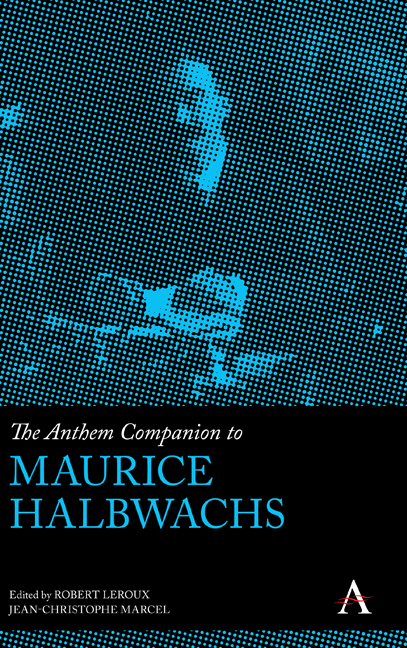Book contents
- Frontmatter
- Contents
- Introduction
- Chapter 1 A Theorist of Collective Memory
- Chapter 2 Halbwachs and the Durkheimian Perspective on History
- Chapter 3 Maurice Halbwachs, Sociologist of Memory: His Reception in Italy and the Development of the Sociology of Memory
- Chapter 4 Population as the Body of Society
- Chapter 5 Urban Morphology and Social Morphology: Marcel Roncayolo and the Work of Maurice Halbwachs
- Chapter 6 Halbwachs’s Leibniz and Halbwachs’s Sociology
- Chapter 7 Halbwachs on Quetelet and the Use of Statistics in Sociology
- Chapter 8 Maurice Halbwachs and the Sociology of Consumption and Social Classes
- Chapter 9 From Criticism of Moral to the Probalistic Test
- Chapter 10 The Age Criterion: Between Sociology and Biology
- Chapter 11 Speculation: Order or Disorder?
- List of Contributors
- Index
Chapter 9 - From Criticism of Moral to the Probalistic Test
Published online by Cambridge University Press: 23 February 2022
- Frontmatter
- Contents
- Introduction
- Chapter 1 A Theorist of Collective Memory
- Chapter 2 Halbwachs and the Durkheimian Perspective on History
- Chapter 3 Maurice Halbwachs, Sociologist of Memory: His Reception in Italy and the Development of the Sociology of Memory
- Chapter 4 Population as the Body of Society
- Chapter 5 Urban Morphology and Social Morphology: Marcel Roncayolo and the Work of Maurice Halbwachs
- Chapter 6 Halbwachs’s Leibniz and Halbwachs’s Sociology
- Chapter 7 Halbwachs on Quetelet and the Use of Statistics in Sociology
- Chapter 8 Maurice Halbwachs and the Sociology of Consumption and Social Classes
- Chapter 9 From Criticism of Moral to the Probalistic Test
- Chapter 10 The Age Criterion: Between Sociology and Biology
- Chapter 11 Speculation: Order or Disorder?
- List of Contributors
- Index
Summary
All along his researches, Halbwachs addressed the issue of causality, as he did for social space and social time (see in the present volume, Chapter 1, “Collective Memory”). For the young philosopher introduced to Kant's Critique de la raison pure by his two masters Henri Bergson and Émile Durkheim, involved in the European neo-Kantian movement of the beginning of the twentieth century, like his German homologous, Ernst Cassirer.
Neither is space, nor any a priori geometrical determination of space, a transcendental representation, but only the knowledge that such a representation is not of empirical origin, and the possibility of its relating to objects of experience, although itself a priori, can be called transcendental. So also, the application of space to objects in general would be transcendental; but if it be limited to objects of sense it is empirical. (Kant 1787; 79; English translation: 1878; French translation: 1905, 56)
Causality, time, or space where a priori to be investigated, if not like Mauss and Durkheim in 1903 (and then Durkheim, 1912) for the two last, but at least scrutinizing causality by means of mathematical improvements related to probabilities or philosophy of science. Three steps may be found in his inquiries. First, there were the two dissertations (1913a, 1913b), the core on the working-class conditions of life and the complementary one on Quetelet's theory of average man. Second, Halbwachs left notebooks where we can find his peregrinations among the works of earlier contributors to the history of the mathematics of probabilities, or reflexions on very recent publications like for instance this comment on some information he got after the publication of Werner Heisenberg's article on his theorem of uncertainty in quantum physics (1927), left in his first note book (94):
Yesterday at Bischwiler where we went by car, [Edmond] Bauer [physicist and brother-in-law of the Durkheimian Robert Hertz] told me that a German [sic, namely Heisenberg] just published interesting works on quanta inspired by Bohr and Einstein. Bohr was questioning the principle of causality: conditions (causes) being well determined, one would only arrive to probable results. [Here] rays are not carrying causality but probability.
- Type
- Chapter
- Information
- The Anthem Companion to Maurice Halbwachs , pp. 139 - 144Publisher: Anthem PressPrint publication year: 2021



